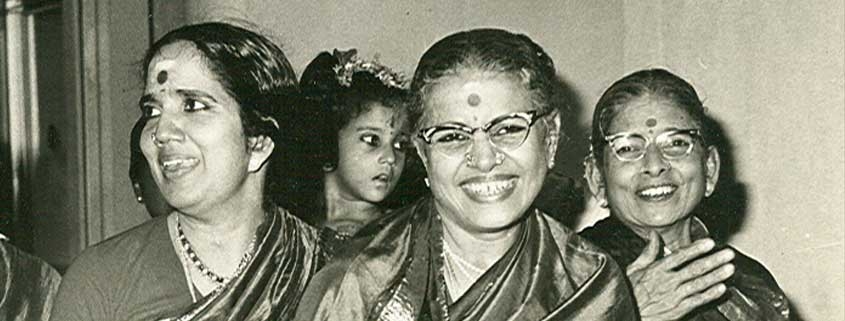Gowri Ramnarayan
(First Published in Jan 2005 in Sruti Notes, Newsletter of Sruti – India Music and Dance Society, Delaware Valley, USA)
Here are Gowri Ramnarayan’s email replies to some questions, interspersed with her writings.
Earliest Memories of Patti
As I wrote in the Hindu article titled “An Elegant Simplicity”: “My earliest memory of Kunjamma is a dreamy vignette. Her fresh-washed hair is spread on a down-turned basket, drying through a mist of incense. I follow her down the staircase into the garden for the tulsi pooja, incessantly ringing the bell in my hand. She tells me, “Don’t skip, walk softly. Ring the bell only when I tell you. Gently.” Dressed in woven-to-order Kanchipuram silk after the oil-turmeric Friday bath, in a halo of abundant curls, eyes lined in home made mye, forehead aglow with kumkumam and vibhuti, diamonds sparkling on ear and nose, Kunjamma looks like a goddess herself. Even as a child I sense that her beauty is not just physical. It has to do with an inner serenity.” I also remember sitting on her lap in the music room at Kalki Gardens, when vidwans like Semmangudi Mama, K S Narayanaswami mama and Tiruvalangadu Sundaresa Iyer and Patti would sing ragas, pausing with an expectant look for me to identify them, and getting absolutely delighted when I got them right.
Visits to Hyderabad
When they came to Hyderabad, Thatha would say as soon as he got off the train that they were all coming to lunch at my house. Patti would say, also just off the train, nalaikku nee tambura pottutaraya cutcherikku? (Will you play the tambura for the cutcheri tomorrow?) I would say yes reluctantly because tambura playing was a painful affair in those three hour cutcheris. I was quite a novice in cooking and housework and so I’d be flummoxed by Thatha’s statement as well, especially since Thatha always brought a lot of people with him, some of them very eminent, like Swami Ranganathananda. Don’t ask me how I managed. I just did, taking help from Pattu Mami, my husband Ram’s aunt who lived there. Thatha and Patti would eat the food with absolute santhosham (happiness) and give me a hundred rupees as a gift, a princely sum in the 1970s. Patti also gave me any saree gifted to her in Hyderabad. She would sing after lunch and have me join her and Radhakka.
Getting Patti to share personal anecdotes
In my book, Past Forward: Six Artists in Search of their Childhood, I have written about eminent personalities including MS: “What were you like in those days?” brings a change in mood. “You can see it in the old pictures,” she (MS) laughs. “A side parting in thick curls pressed down with lots of oil, a huge dot covering most of my forehead, the half- saree pinned to the puff-sleeved blouse with long brooch and longer safety pin, eardrops, nose- rings and bangles of imitation gold…Oh I forgot. The long plait was tied up with a banana stem strip! Or a ribbon which never matched.” Getting ready for the stage meant also the addition of a row of medals on the shoulder… The first stage appearance? “When it happened, I felt only annoyance at being yanked from my favourite game – making mud pies. Someone picked me up, dusted my hands and skirt, carried me to the nearby Sethupathi school where my mother was playing before 50-100 people. In those days that was the usual concert attendance. At mother’s bidding, I sang a couple of songs. I was too young for the smiles and the claps to mean much. I was thinking more of returning to the mud.” I heard these stories mainly because I was traveling with Patti. She was always more relaxed when we traveled, happy, carefree. She always answered any of my questions honestly, sometimes with tears in her voice as she recollected harsher times.
Her Music
In the article “Genius of Song” in Frontline, I wrote: “The warbles and trills of youth – the fine careless rapture of the song bird in springtime – gave way in course of time to richness of timbre, to chiselled, polished execution. The brika flashes and organized raga edifices with high note crescendos were replaced by longer journeys into less trodden ways in the middle and lower registers. These explorations were now undertaken with the freedom and ripeness of an autumn majesty. Retaining the sonorous sweetness and vitality through all these years of upward growth, ‘M.S. music’ now makes an even more ravishing impact on the mind. ‘As I grow older, I feel more and more overwhelmed by the music.’ I feel Kunjakka’s music is too vast a subject for hurried jottings. I could sum up and say that I think the “divinity” came from her innocence as a person and her maturity as a musician who had inherited a centuries old family legacy. I learnt that singing is not a matter of training, technique or even talent. It is an approach to life, a reflection of your personality.



